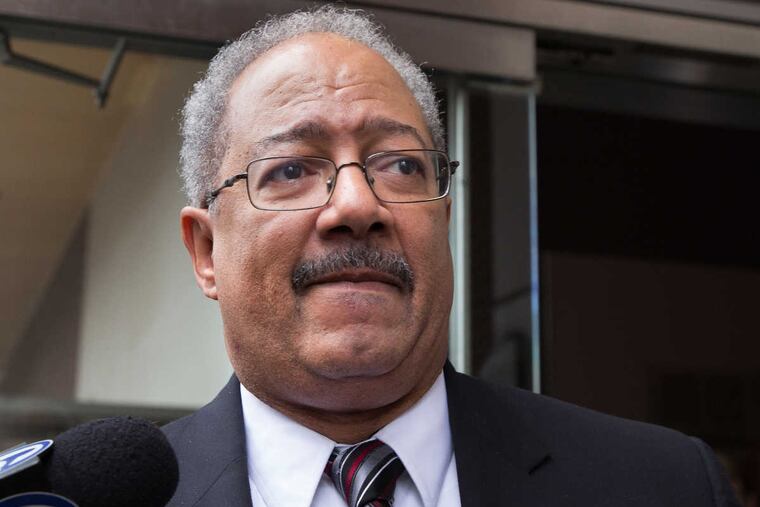Judge rejects Fattah's attempt to stay out of prison during appeal
A federal judge denied U.S. Rep. Chaka Fattah's bid to remain out of prison while he appeals his conviction for racketeering, bribery, money laundering and other crimes.

A federal judge denied U.S. Rep. Chaka Fattah's bid to remain out of prison while he appeals his conviction for racketeering, bribery, money laundering and other crimes.
The Philadelphia Democrat must now report to begin serving his 10-year sentence on Jan. 25, U.S. District Judge Harvey Bartle III wrote in a 10-page opinion.
Fattah, 60, had argued that a U.S. Supreme Court ruling that narrowed the legal definition of political bribery - issued just days after a jury found him and four codefendants guilty in June - was likely to help his appeal. For that reason, his lawyers said in court filings, it would be unfair for the congressman to begin serving a sentence that a higher court could soon throw out.
But Bartle, in denying their request, noted that even if Fattah succeeded in overturning his bribery convictions, the ex-congressman had been found guilty of additional crimes including the theft of money from an education nonprofit to pay back an illegal $1 million loan to his disastrous 2007 mayoral bid.
"[Fattah] was found guilty based on overwhelming evidence and sentenced to ten-year terms of imprisonment that have nothing to do with any question, substantial or otherwise, related to" the bribery counts, the judge wrote.
Lawyers for Fattah and his codefendants have signaled that the Supreme Court case at issue - which overturned the bribery 2014 conviction of former Virginia Gov. and Philadelphia native Robert McDonnell - will be one of the primary planks of their appeals efforts.
Prosecutors accused Fattah of five schemes to misuse money from taxpayers, federal grant programs and wealthy fund-raisers to pay off his personal and political debts. One scheme involved bribes worth $27,000 that he received over a period of years from former Philadelphia Deputy Mayor Herbert Vederman.
In McDonnell's case, the high court held that federal bribery laws do not cover gifts exchanged for routine courtesies such as setting up meetings, hosting events, or making calls on behalf of constituents.
Lawyers for Fattah and Vederman argued that the men's relationship fell squarely within those criteria.
Vederman showered Fattah with gifts, including cash payments to the congressman's children, college tuition for his South African au pair, and $18,000 to help with the purchase of a vacation home in the Poconos.
In exchange, Fattah gave Vederman's girlfriend a job in his district office and lobbied other government officials - including President Obama and U.S. Sen. Robert P. Casey Jr. (D., Pa.) - in hopes of landing Vederman an ambassadorship.
Defense lawyers for both men have argued in posttrial motions that the gifts Vederman gave Fattah were not intended to buy official actions from the congressman and were evidence of nothing more than the long friendship the two men shared.
But Bartle had rejected their claims, calling the evidence "overwhelming" and saying that jurors were likely to have convicted Fattah and Vederman of bribery even under the new criteria set out by the McDonnell decision.
He reiterated that view in his opinion Tuesday.
"No rational jury, in our view," he wrote, "could have found otherwise."
Also Tuesday, Bartle denied similar motions for two of Fattah's codefendants, Karen Nicholas and Robert Brand, who sought to postpone their sentences while appealing convictions tied to roles they played in helping the former congressman pay back a campaign loan with stolen charitable funds.
215-854-2608
@jeremyrroebuck